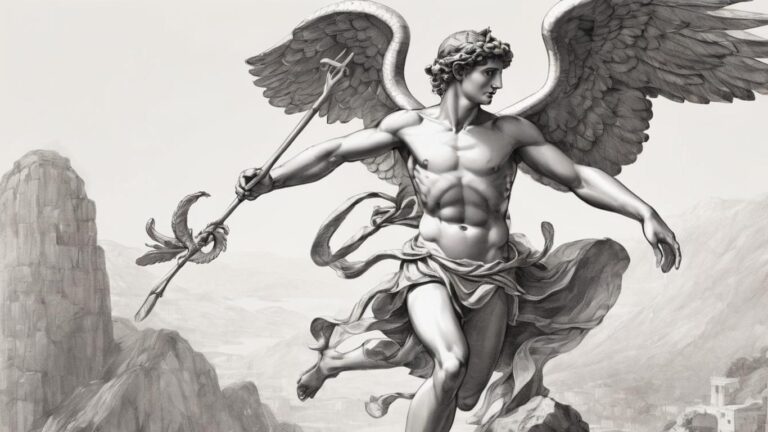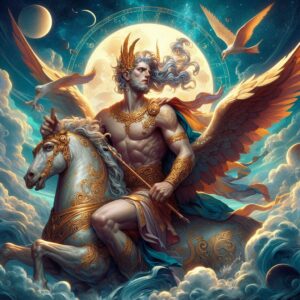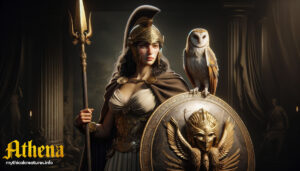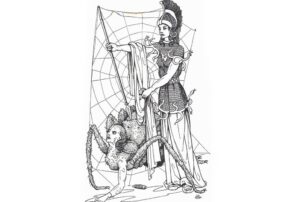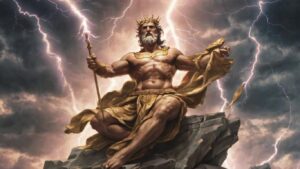Table of Contents
In Greek mythology, Hermes, the messenger god and herald of the Olympian gods, embodies swiftness, cunning, and versatility. Depicted with a winged helmet and sandals, he symbolizes travel, trade, communication, and thievery. Beyond messenger duties, Hermes guided souls to the underworld and featured prominently in myths. As a patron of athletes, travelers, and merchants, he personifies wit and eloquence.
Origins
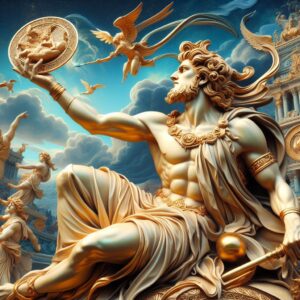
According to Greek mythology, Hermes was born in a cave on Mount Cyllene in Arcadia. His mother was Maia, a Titaness and daughter of Atlas. The circumstances of his birth are rather interesting. Maia was a virgin, and Zeus, the king of the gods, impregnated her while she was sleeping. Hermes was born prematurely and exhibited extraordinary abilities from the moment of his birth.
Shortly after his birth, Hermes displayed cunning and cleverness by stealing Apollo‘s cattle. To cover his tracks, he made the cattle walk backward, confusing anyone who might try to track them. When Apollo accused Hermes of the theft, Zeus intervened and asked Hermes to return the cattle. As a gesture of reconciliation, Hermes gifted Apollo the lyre, an instrument he had created from a tortoise shell. This act marked the beginning of their complex relationship, as Hermes became associated not only with trickery but also with music, communication, and commerce.
As a divine messenger, Hermes plays a significant role in various myths and stories. His multifaceted nature is reflected in his diverse responsibilities, including guiding souls to the underworld, protecting travelers, and facilitating communication among the gods. Hermes is a dynamic and complex figure in Greek mythology, embodying the traits of a trickster and a benevolent guide.
Appearance
Hermes, a handsome god, reflects his youthfulness as one of the Olympian deities. He may wear talaria, adding to the perception of speed. Hermes, linked to music, invented the lyre, depicted playing this instrument. These attributes shape Hermes’ multifaceted role in Greek mythology.
In art and literature, these depictions of Hermes continue to captivate audiences. Whether portrayed in film adaptations of Greek myths or reimagined in contemporary literature, He remains an enduring and dynamic character. His iconography, from the winged helmet to the caduceus, serves as a visual shorthand for his multifaceted domains. As audiences engage with new interpretations, the timeless essence of Hermes persists, making him a symbol that transcends the boundaries of ancient myth.
Family
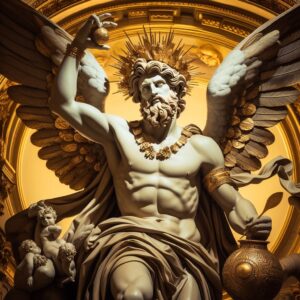
In Greek mythology, Hermes had several romantic liaisons and offspring, but his most recognized union was with the nymph Maia. Maia was one of the Pleiades, the daughters of Atlas. The couple had a son named Pan, the rustic god of the wild, shepherds, and rustic music.
Although Maia is frequently cited as Hermes’ consort, it’s crucial to emphasize that in Greek mythology, divine relationships weren’t formalized like human marriages. The gods, known for numerous affairs, maintained diverse connections, and Hermes, linked to fertility, was no exception.
